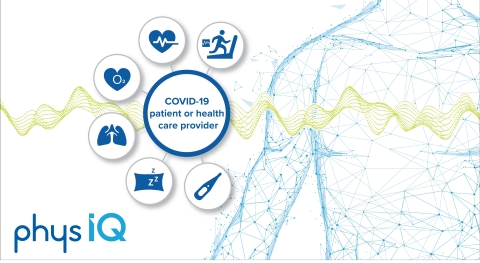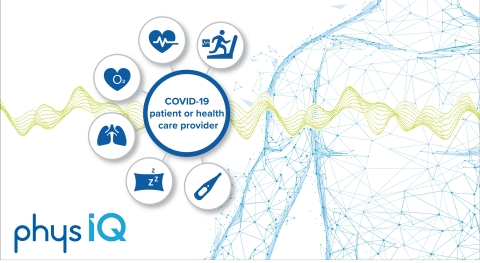CHICAGO--(BUSINESS WIRE)--The University of Illinois Hospital and Health Sciences System (UI Health), Chicago Medical Society and AI healthcare tech pioneer physIQ announced today that physIQ’s pinpointIQTM continuous remote patient monitoring (cRPM) system will monitor the vital signs of the health system’s frontline health care workers and high-risk patients with COVID-19 for early signs of disease exacerbation.
The pinpointIQ system is an FDA-cleared AI analytics platform that monitors the vital signs through a wearable biosensor detecting changes in physiologic indices of health status. The system then notifies clinicians charged with monitoring data produced by pinpointIQ for clinically-relevant changes in vital signs. This allows an early plan of care to be developed that may prevent complications or hospitalization.
“Our top priority is protecting and promoting the health and safety of our patients and staff, and COVID-19 has created an urgent need for innovative, tech-driven solutions,” said UIC’s Dr. Terry Vanden Hoek, Chief Medical Officer at UI Health and Head of the Department of Emergency Medicine at the College of Medicine. “We are excited to partner with the Chicago Medical Society and physIQ to offer home monitoring options to some patients and staff with COVID-19 that could help us detect physiologic changes of illness progression that may indicate a need for early follow up with their physician.”
Through this collaboration, the University of Illinois Hospital will have access to the technology and monitor certain staff and patients with COVID-19 with risk factors such as obesity and heart or lung conditions and who are isolating at home. “Continuous monitoring of patients using physiological modeling with AI offers an opportunity to detect a virus exacerbation early. Early intervention may prevent the body from initiating the ‘cytokine storm’ that we think causes the most severe complications of COVID-19,” Vanden Hoek said. “We hope this technology will help us to closely follow the health of our staff – in partnership with their primary care providers – and patients while they are at home with COVID-19.”
The potential utility of pinpointIQTM for use with COVID-19 patients is supported by the work physIQ has done with USAID, the CDC and Scripps Health in patients with Ebola, as well as in clinical studies conducted with Veterans Affairs in patients with severe congestive heart failure.
The pinpointIQ system comprises a VitalConnect wearable biosensor, pulse oximeter and smartphone streaming of physiological data to a HIPAA compliant cloud-based server, which uses FDA-cleared analytics to produce clinically actionable insight. For homebound UI Health patients, the system will be prescribed by an emergency room physician and shipped directly to the patient’s home without requiring direct physical contact from a clinician. For health care workers who choose to participate, the system will be deployed at the hospital, through UI Health’s employee health program.
“To make a life-changing impact, we need to be at the front line of health care,” noted Gary Conkright, CEO of physIQ. “We are proud to support homebound healthcare workers and patients who are high risk for COVID-19 exacerbation with our remote physiologic monitoring technology. This opportunity also allows physIQ to support UI Health in its mission to reduce and eliminate the health disparities experienced by vulnerable communities, which have recently seen disproportionate rates of COVID-19 infection and death due to COVID-19 complications.”
“PhysIQ is alone in offering deep analytics and AI to monitor the health of patients and their healthcare providers,” said Ted Kanellakes, Executive Director for the Chicago Medical Society. “The Chicago Medical Society is proud to support this important collaboration. As a provider to underserved communities, UI Health and physIQ together will make a real difference to the people of Chicago.”
About the University of Illinois Hospital & Health Sciences System
The University of Illinois Hospital & Health Sciences System (UI Health) provides comprehensive care, education, and research to the people of Illinois and beyond. A part of the University of Illinois at Chicago (UIC), UI Health comprises a clinical enterprise that includes a 462-bed tertiary care hospital (the University of Illinois Hospital), 21 outpatient clinics, and 11 Mile Square Health Center facilities, which are Federally Qualified Health Centers. It also includes the seven UIC health science colleges: the College of Applied Health Sciences; the College of Dentistry; the School of Public Health; the Jane Addams College of Social Work; and the Colleges of Medicine, Pharmacy, and Nursing, including regional campuses in Peoria, Quad Cities, Rockford, Springfield, and Urbana. UI Health is dedicated to the pursuit of health equity.
About the Chicago Medical Society
Founded in 1850, the Chicago Medical Society is one of the oldest and largest medical societies in the United States. But our mission remains as vital as ever. In addition to improving public health locally, CMS’ programs educate physicians of all specialty areas while encouraging professional interaction and unity. The Society’s grassroots advocacy benefits all 17,000 physicians in Cook County.
About physIQ
PhysIQ is a leading digital medicine company dedicated to generating unprecedented health insight using continuous wearable biosensor data and advanced analytics. Its enterprise-ready cloud platform continuously collects and processes data from any wearable biosensor using a deep portfolio of FDA-cleared analytics. The company has published one of the most rigorous clinical studies to date in digital medicine and are pioneers in developing, validating, and achieving regulatory approval of Artificial Intelligence-based analytics. With applications in both healthcare and clinical trial support, physIQ is transforming continuous physiological data into insight for health systems, payers, and pharmaceutical companies.
For more information, please visit www.physIQ.com. Follow us on Twitter and LinkedIn.




